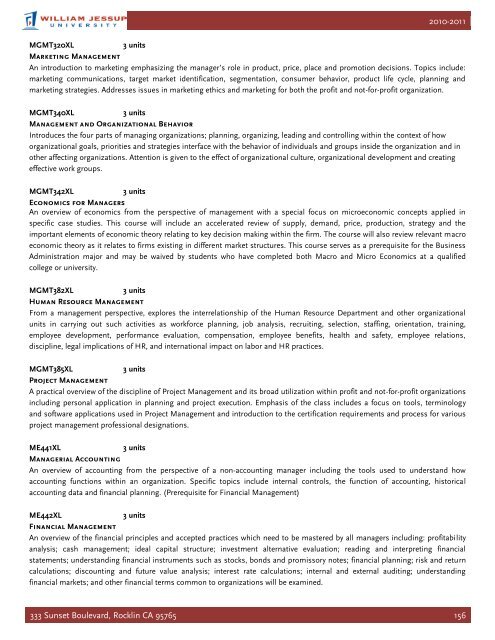School of Professional Studies - William Jessup University
School of Professional Studies - William Jessup University
School of Professional Studies - William Jessup University
You also want an ePaper? Increase the reach of your titles
YUMPU automatically turns print PDFs into web optimized ePapers that Google loves.
2010-2011<br />
MGMT320XL 3 units<br />
Marketing Management<br />
An introduction to marketing emphasizing the manager’s role in product, price, place and promotion decisions. Topics include:<br />
marketing communications, target market identification, segmentation, consumer behavior, product life cycle, planning and<br />
marketing strategies. Addresses issues in marketing ethics and marketing for both the pr<strong>of</strong>it and not-for-pr<strong>of</strong>it organization.<br />
MGMT340XL 3 units<br />
Management and Organizational Behavior<br />
Introduces the four parts <strong>of</strong> managing organizations; planning, organizing, leading and controlling within the context <strong>of</strong> how<br />
organizational goals, priorities and strategies interface with the behavior <strong>of</strong> individuals and groups inside the organization and in<br />
other affecting organizations. Attention is given to the effect <strong>of</strong> organizational culture, organizational development and creating<br />
effective work groups.<br />
MGMT342XL 3 units<br />
Economics for Managers<br />
An overview <strong>of</strong> economics from the perspective <strong>of</strong> management with a special focus on microeconomic concepts applied in<br />
specific case studies. This course will include an accelerated review <strong>of</strong> supply, demand, price, production, strategy and the<br />
important elements <strong>of</strong> economic theory relating to key decision making within the firm. The course will also review relevant macro<br />
economic theory as it relates to firms existing in different market structures. This course serves as a prerequisite for the Business<br />
Administration major and may be waived by students who have completed both Macro and Micro Economics at a qualified<br />
college or university.<br />
MGMT382XL 3 units<br />
Human Resource Management<br />
From a management perspective, explores the interrelationship <strong>of</strong> the Human Resource Department and other organizational<br />
units in carrying out such activities as workforce planning, job analysis, recruiting, selection, staffing, orientation, training,<br />
employee development, performance evaluation, compensation, employee benefits, health and safety, employee relations,<br />
discipline, legal implications <strong>of</strong> HR, and international impact on labor and HR practices.<br />
MGMT385XL 3 units<br />
Project Management<br />
A practical overview <strong>of</strong> the discipline <strong>of</strong> Project Management and its broad utilization within pr<strong>of</strong>it and not-for-pr<strong>of</strong>it organizations<br />
including personal application in planning and project execution. Emphasis <strong>of</strong> the class includes a focus on tools, terminology<br />
and s<strong>of</strong>tware applications used in Project Management and introduction to the certification requirements and process for various<br />
project management pr<strong>of</strong>essional designations.<br />
ME441XL 3 units<br />
Managerial Accounting<br />
An overview <strong>of</strong> accounting from the perspective <strong>of</strong> a non-accounting manager including the tools used to understand how<br />
accounting functions within an organization. Specific topics include internal controls, the function <strong>of</strong> accounting, historical<br />
accounting data and financial planning. (Prerequisite for Financial Management)<br />
ME442XL 3 units<br />
Financial Management<br />
An overview <strong>of</strong> the financial principles and accepted practices which need to be mastered by all managers including: pr<strong>of</strong>itability<br />
analysis; cash management; ideal capital structure; investment alternative evaluation; reading and interpreting financial<br />
statements; understanding financial instruments such as stocks, bonds and promissory notes; financial planning; risk and return<br />
calculations; discounting and future value analysis; interest rate calculations; internal and external auditing; understanding<br />
financial markets; and other financial terms common to organizations will be examined.<br />
333 Sunset Boulevard, Rocklin CA 95765 156


